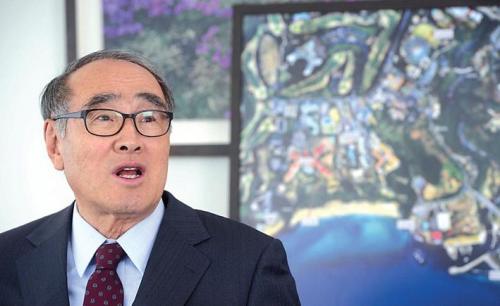DMZ among agendas to be discussed at World Conservation Congress in Jeju
Environmental problems are indisputably global, but efforts to forge a global response have proven divisive, even polarizing, amid persistent fears of an impact on the economy.
The 2012 IUCN World Conservation Congress to be held in Korea later this year will provide a converging point, and hopefully a momentum for a change in thinking, said Lee Hong-koo, former prime minister now leading the country’s preparations for the event.
“Environmental meetings in the past have often divided the world into wealthier countries (pushing for strong actions) and developing nations that fear such a move could slow down their economic development,” he said in an interview with The Korea Herald.
But there have been some positive changes recently, with countries like Korea coming forward with a new paradigm for economic growth -- green growth, he explained.
“There has been a growing awareness globally that it doesn’t have to be a choice between (environment and economic growth),” he said. “With green growth, a country can kill two birds with one stone.”
Green growth is a concept that focuses on overhauling economies to synergize development and environmental protection. It envisions a low-carbon, green economy in which investments in alternative energy, resource savings and other environmental sectors are drivers of growth.
In 2008, Korea proclaimed green growth as a national development model.
“Korea, although a late-comer to the global environmental scene, is getting a lot of attention lately with its push for green growth,” Lee said.

Lee Hong-koo, chairman of the Korean Organizing Committee for the 2012 IUCN World Conservation Congress, speaks during a recent interview at his office in central Seoul. (Park Hae-mook/The Korea Herald)
The WCC, to be held on Jeju Island Sept. 6-15, will further highlight Korea’s leadership in that field, he added.
Held every four years, the WCC is regarded as the largest environmental gathering in the world, bringing together thousands of people from all sectors of society -- governments, non-governmental organizations, United Nations bodies, academia and the business world.
Lee, a seasoned politician, diplomat and administrator, took charge of the Korean organizing committee with its inception in February 2011.
His goal goes beyond a successful hosting of the event. He wants to make the meeting an opportunity for Korea to play a leadership role in the global environmental field.
“The IUCN World Conservation Congress, for the first time in its 64-year history, is coming to this part of the world, away from Europe which has long dominated environmental agendas,” Lee said.
During its 10-day run, over 500 forums will take place. As the host nation, Korea has suggested some 70 agenda items that reflect its concerns and those of many developing countries in the region.
Among them is the Demilitarized Zone, a 250-kilometer-long and 4-kilometer-wide strip of land that separates the two sides of Korea.
Heavily mined and fortified, the area is one of the world’s richest wildlife refuges, with no human activity for over 60 years.
“The world, including North Korea, is very interested in the DMZ, which is an environmental treasure trove,” Lee said.
He expressed hopes that the communist state, also an IUCN member, would send its delegation to the Jeju congress, to discuss with South Korean members the DMZ and other issues of common interests.
The IUCN head office has sent out an official invitation to North Korea. There was no response from the North yet, but Lee was keeping his fingers crossed.
Last year, experts from the two Koreas had held a meeting, despite icy overall relations, to discuss a possible volcano eruption on Mount Baekdu, the highest mountain on the Korean Peninsula located near North Korea’s northern border with China, Lee pointed out.
“I am feeling positive (about the North’s participation in the congress),” he said.
This year’s congress is expected to draw the largest number of participants in IUCN’s history. On top of the main program, which is packed with hundreds of forums and discussion sessions, it will add a variety of fringe events, broadening the congress’ horizons to a new territory.
Among those events is the World Leaders’ Dialogue, in which famous business magnates will hold a public lecture on five themes, including climate change and poverty. Two important meetings are to be held on the sidelines of the congress -- a summit of local government heads and another of chief of national park authorities.
By Lee Sun-young (
milaya@heraldcorp.com)






![[Hello India] Hyundai Motor vows to boost 'clean mobility' in India](http://res.heraldm.com/phpwas/restmb_idxmake.php?idx=645&simg=/content/image/2024/04/25/20240425050672_0.jpg&u=)